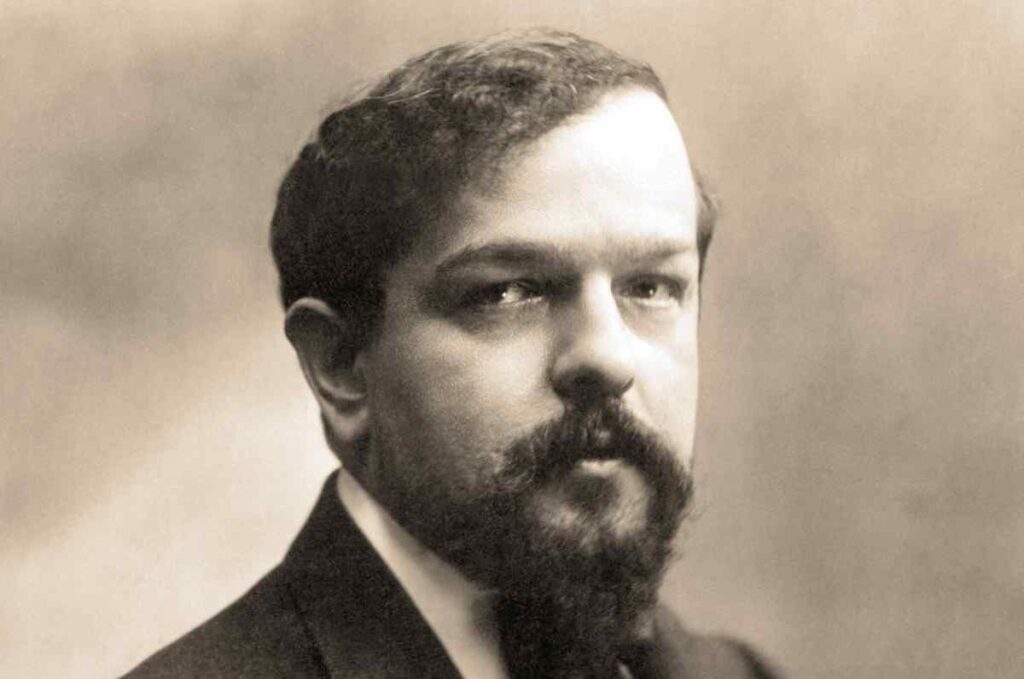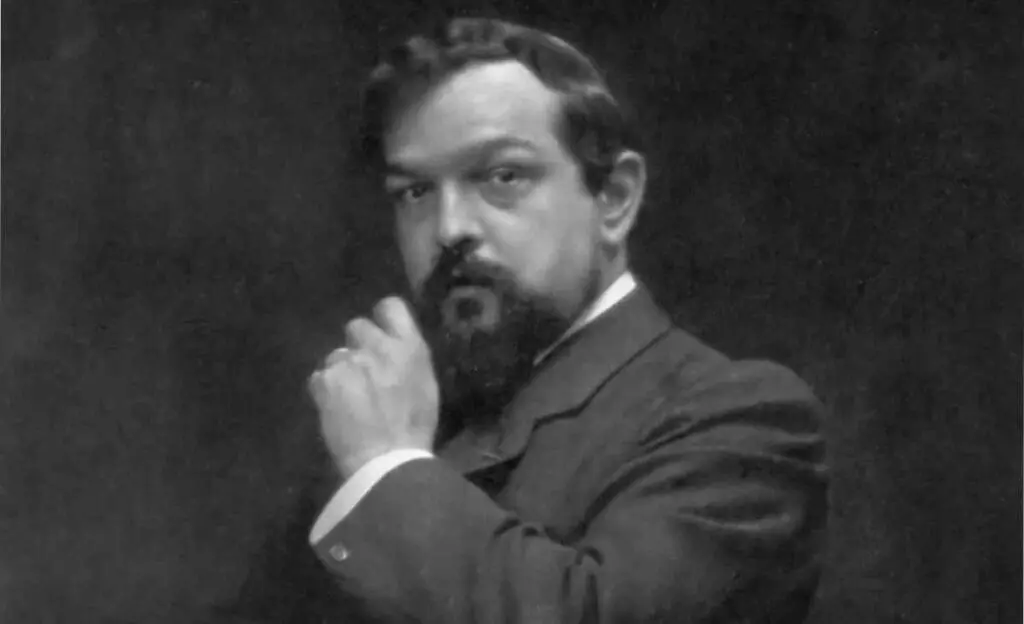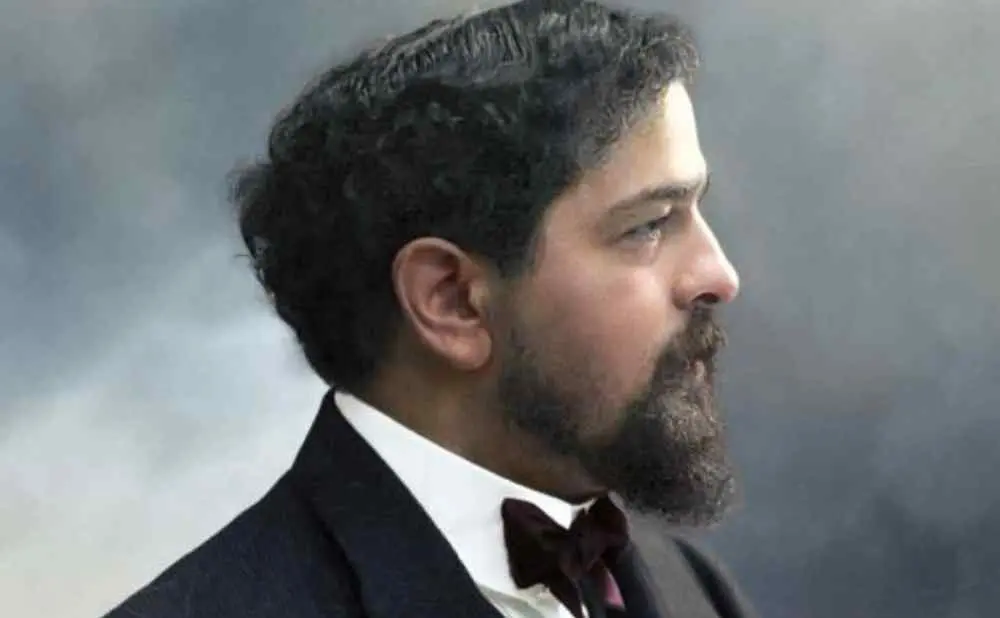Over a long creative career, Claude Debussy created a number of brilliant works. Originality and mystery benefited the maestro. He did not recognize classical traditions and entered the list of so-called "artistic outcasts". Not everyone perceived the work of a musical genius, but one way or another, he managed to become one of the best representatives of impressionism in his native country.

Childhood and youth
He was born in Paris. Maestro's date of birth is August 22, 1862. Claude was brought up in a large family. For some time the family lived in the capital of France, but after a while a large family moved to Cannes. Soon Claude began to get acquainted with the best examples of classical music. He studied keyboards under the Italian Jean Cerutti.
He learned quickly. Claude grasped everything on the fly. After some time, the young man continued to get acquainted with music, but already at the Paris Conservatory. He enjoyed his work. Claude was in good standing with teachers.
In 1874, the efforts of the young musician were appreciated. He received his first award. Claude pulled the trail of a promising musician and composer.
He spent his summer holidays at the castle of Chenonceau, where he entertained guests with his amazing piano playing. A luxurious life was not alien to him, so a year later the musician took a teaching position in the house of Nadezhda von Meck. After that, he devoted several years to traveling around European countries. Then he composes several miniatures. We are talking about the works of Ballade à la lune and Madrid, princesse des Espagnes.
He constantly violated the classical canons of composition. Alas, this approach was liked by all the teachers of the Paris Conservatory. Despite this, Debussy's obvious talent was untarnished by improvisation. He received the "Prix de Rome" for composing the cantata L'enfant prodigue. After that, Claude continued his studies in Italy. He liked the atmosphere that prevailed in the country. The Italian air was saturated with innovation and freedom.
Perhaps that is why the musical works of Claude, written during the period of residence in Italy, were described by teachers as "bizarre, ornate and incomprehensible." Returning to his homeland, he lost his freedom. Claude was influenced by the writings of Richard Wagner. After some time, he caught himself thinking that the works of the German composer had no future.
Creative way
The debut works that came out from the pen of the maestro did not bring him popularity. In general, the public warmly accepted the works of the composer, but it was far from recognition.

Colleague composers recognized Claude's talent in 1893. Debussy was enrolled in the committee of the National Musical Society. There, the maestro presented the recently written piece of music "String Quartet".
This year will be a milestone for the composer. In 1983, another event will take place that will radically change his position in society. Claude attended a performance based on the play by Maurice Maeterlinck "Pelléas et Mélisande". He left the theater with an unpleasant aftertaste. The maestro realized that the play must be reborn into an opera. Debussy received the approval of the Belgian author for a musical adaptation of the work, after which he set to work.
The peak of the creative career of Claude Debussy
A year later he completed the opera. The composer presented the work "Afternoon of a Faun" to the society. Not only fans and influential critics praised Claude's efforts. He was at the peak of his creative career.
In the new century, he began to attend meetings of the Les Apaches informal society. The community included various cultural figures who called themselves “artistic outcasts”. Most of the organization's members were at the premiere of Claude's orchestral Nocturnes entitled "Clouds", "Celebrations" and "Sirens". The opinion of cultural figures was divided: some considered Debussy an outright loser, while others, on the contrary, praised the composer's talent.
In 1902, the premiere of the opera Pelléas et Mélisande took place. The musical work again divided the society. Debussy had both admirers and those who did not take the Frenchman's work seriously.
Despite the fact that the opinion of music critics was divided, the premiere of the presented opera was a great success. The performance was warmly received by the audience. Debussy strengthened his authority. In the same period of time, he became a knight of the Order of the Legion of Honor. Note that the complete edition of the sheet music was published a couple of years after the presentation of the vocal score.
Soon the premiere of one of the most penetrating works of Debussy's repertoire took place. We are talking about the symphonic composition "Sea". The essay again gave rise to controversy. Despite this, Claude's works were increasingly heard from the stages of the best European theaters.
Success motivated the French composer to new exploits. At the beginning of the new century, he created perhaps the most famous pieces for the piano. Particularly noteworthy are the "Preludes", which consist of two notebooks.

In 1914 he began writing a cycle of sonatas. Alas, he never finished his work. At this time, the health of the maestro was greatly shaken. In 1917 he composed compositions for piano and violin. This was the end of his career.
Details of the personal life of Claude Debussy
Undoubtedly, the composer enjoyed success with the fairer sex. Debussy's first serious passion was a charming Frenchwoman named Marie. At the time of their acquaintance, she was married to Henri Vasnier. She became Claude's mistress and consoled him for 7 years.
The girl found strength in herself and broke off relations with Debussy. Marie returned to her husband. For Claudie, a married Frenchwoman has become a real muse. He dedicated more than 20 musical compositions to the girl.
He did not grieve for long and found solace in the arms of Gabrielle Dupont. After a couple of years, the lovers decided to take their relationship to a new level. The couple settled in the same apartment. But Debussy turned out to be an unfaithful man - he cheated on his chosen one with Teresa Roger. In 1894, he proposed to a woman. Claude's acquaintances condemned his behavior. They did everything to ensure that this marriage did not take place.
Claude married only after 5 years. This time it was Marie-Rosalie Textier who stole his heart. The woman did not dare to become the wife of the composer for a long time. He went to the trick, saying that if she did not marry him, he would commit suicide.
The wife, possessed of divine beauty, but was naive and stupid. She did not understand music at all and could not keep Debussy company. Without thinking twice, Claude sends the lady to her parents and starts an affair with a married woman named Emma Bardak. The official wife, who learned about her husband's intrigues, tried to commit suicide. When friends found out about the next adventures of Debussy, they condemned him.
In 1905, Claude's mistress became pregnant. Debussy, trying to protect his beloved, moved her to London. After some time, the couple returned to Paris. The woman gave birth to a daughter from the composer. Three years later they got married.
Death of Claude Debussy
In 1908, he was given a disappointing diagnosis. For 10 years, the composer struggled with colorectal cancer. He underwent surgery. Alas, the operation did not improve Claude's condition.
In the last months of his life, he practically did not compose musical works. It was difficult for him to do basic things. He was withdrawn and not sociable. Most likely, Debussy understood that he would soon die.
He lived thanks to the care of his official wife and their common daughter. In 1918, the treatment no longer helped. He died on March 25, 1918. He died in his own home, in the capital of France.
Relatives could not organize a solemn funeral procession. It's all because of the First World War. The maestro's coffin was carried through the empty French streets.



